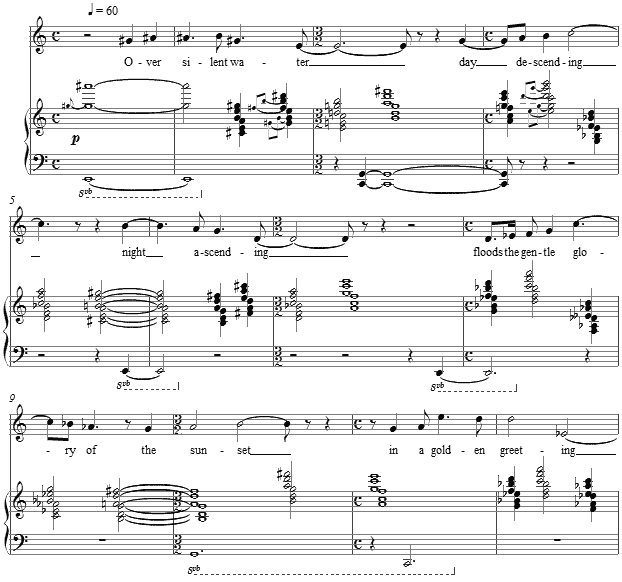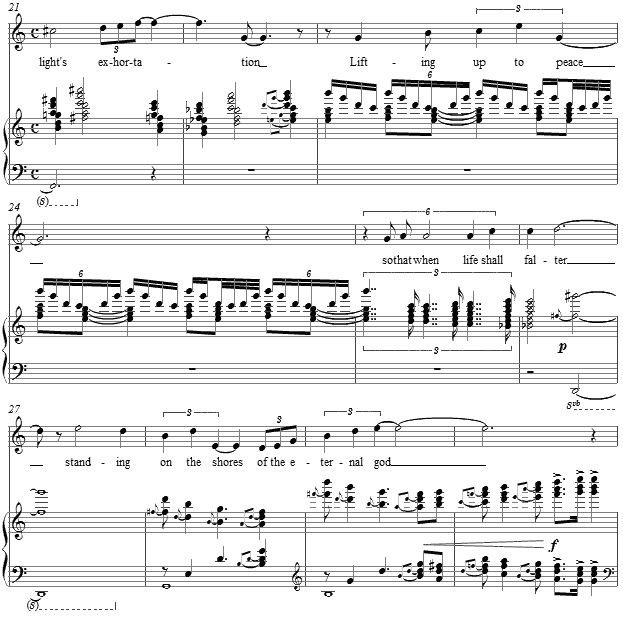Music and Texts of GARY BACHLUND
Vocal Music | Piano | Organ | Chamber Music | Orchestral | Articles and Commentary | Poems and Stories | Miscellany | FAQs
Over silent waters - (2009)
E. E. Cummings
for soprano and piano
for Professor Roy Travis
Over silent water
day descending
night ascending
floods the gentle glory of the sunset
In a golden greeting
splendidly to westward
as pale twilight
trem-
bles
into
Darkness
comes the last light's gracious exhortation
Lifting up to peace
so when life shall falter
standing on the shores of the
eternal
god
May I behold my sunset
Flooding
over silent waters
[ 3 pages, circa 3' 30" ]
E. E. Cummings
Originally titled "Finis," the text may be found in Eight Harvard Poets, New York, Laurence J. Gomme, 1917. I have taken the setting's title from the last line of the text.
The setting opens with a widely spaced chord, with the highest partial a favorite component of many chord forms which one of my past composition professors, Roy Travis, often exploited in his work. While not unique to his work alone, it is nonetheless reminiscent for me, and that is enough for the setting is dedicated to him. The parallel six-note polytonal chords move through various chromatic placements, outside of any one tonic key center, and the vocal line remains linked functionally to the changing tonal centers. Conceived for a lyric soprano, the setting should be sung with a gentility and in shades of subtlety through to the climaxes.
The accompaniment's filigree which underpins this textual statement about "peace" should have a music box quality, gently supportive of the vocal line. Only at the restatements of "god" does the dynamic become louder, though then dropping back to a subito piano thereafter. The work ends quietly with a reprise of the statement "Lifting up to peace."
Roy Travis
Professor Emeritus Roy Travis (b. 1922) served on my master's committee at the University of California, Los Angeles, and was for many years a trusted teacher, friend and colleague. I assisted him in some ways as well, recording some of his ongoing work. Roy Travis studied at the Juilliard School and Columbia University (1947–51) and with Darius Milhaud at the Paris Conservatory. He taught first in New York at Mannes College of Music (1952-57) , then at UCLA beginning in 1957, and named full professor in 1968. He received a Guggenheim Fellowship in 1982. Travis worked with Felix Salzer, bringing him as guest to UCLA in the spring semesters of 1959 and 1960, and was an well reputed advocate of Schenkerian Theory in the United States with his articles published in Journal of Music Theory and Perspectives of New Music. Travis compositions include two operas The Passion of Oedipus (1968) and The Black Bacchantes (1982), as well as the Chamber String Quartet (1958); Duo Concertante for violin and piano (1967); Barma, for septet (1968), Orchestral Collage (1968) and Piano Concerto (1969). Additionally Professor Travis worked in electronic music at the studio at University of California at Los Angeles, from 1969. Travis had an interest in African music, partly through his meeting with his former student, Akin Euba. During my last years' friendship with him, I helped record some demos of his ongoing work on a full length opera, Hamlet. along with Robert Lloyd, Brian Asawa, Zita Carno and Natalie Limonick.
The score for Over silent waters is available as a free PDF download, though any major commercial performance or recording of the work is prohibited without prior arrangement with the composer. Click on the graphic below for this piano-vocal score.



